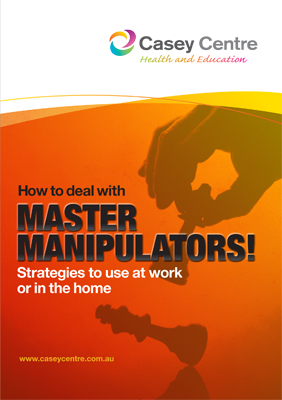Dr Mary Casey How to Deal with Master Manipulators Interview

Dr Mary Casey How to Deal with Master Manipulators Interview
Dreading the return to work because of that difficult manager or colleague? Do they turn your days into a series of battles, make you feel helpless or powerless, or drain you of energy? You could very likely be the target of a manipulator, says Dr Mary Casey (Doctorate of Psychology), conflict-resolution specialist and CEO of health and education company Casey Centre, with 200-plus employees.
Instead of planning that next sickie, Dr Casey says you deal with manipulation using her simple, proven strategies. "Manipulation can be either aggressive or passive aggressive. Openly aggressive behaviour such as bullying is easy to identify, but covert attacks are very difficult to spot. As a guideline, you know you're being manipulated when the problem is ongoing, and you are left feeling unsure of where you stand, anxious, stressed or even physically sick."
How you respond to manipulative behaviour will determine whether or not you become a target, Dr Casey says in her new DVD and workbook, How to Deal with Master Manipulators (Casey Centre, $29.95). It provides proven strategies to identify manipulators, reveal their tactics, explore why victims become victims, and provide behavioural tools to deal with manipulation.
"Manipulation is prevalent in workplaces, because their top-down structures are the perfect breeding ground for control and power tactics. Manipulators aim to covertly or overtly control and overpower the behaviours of others, even if it robs another person of their freedom of choice, reason and rationality. They may abuse their positions or responsibilities, and overstep accepted boundaries in the workplace."
Dr Casey researched manipulation for four years after becoming the target of a manipulative senior employee in her business. "I learned why I was a perfect target and what I needed to change in order to not be a victim," she says. "I lacked personal boundaries."
Offensive tactics used by manipulators:
Threats: Use concealed or open threats to keep their targets anxious.
Ask "harmless" questions: Gather information to use against you.
Refutation: Deny they have done wrong.
Discrediting: Take credit for things you've done, while discrediting you in return.
Distraction: Change the subject to evade the issue or gain time.
Accusations or discrediting: Shift the blame to others and detract in subtle, hard-to-detect ways.
Deception: Withhold large amounts of the truth, distort the truth, or are vague.
How to deal with a manipulative boss:
When the manipulator is someone you report to, there are only two solutions, says Dr Casey:
Disengage emotionally: Set boundaries and use assertiveness. You can expect your salary and other benefits of the job, but you must relinquish your need for positive feedback or recognition.
Disengage physically: If you are emotionally unable to do the above, or if the situation becomes unbearable, you'll need to consider leaving your job. Your health and your family will thank you for it!
How to deal with a manipulative co-worker:
When the manipulator is someone you don't report to, use the following strategies:
Set boundaries: Let them know what you will and won't accept.
Think rationally: Find out what they want from you, and stop giving it to them.
Observe only outcomes: Don't try to second-guess the meaning behind their words or actions.
Be clear and specific: Ensure your body language backs your words.
Stand your ground: When they put pressure on you, repeat the same statement each time.
Keep them responsible: Don't let them get away with shifting the blame.
Act fast: They interpret your silence as agreement if you wait for the "right time" to address the issue.
Accept no excuse for inappropriate behaviour. Re-focus on the issue you are trying to confront.
For more information, visit www.dealwith manipulators.com.au

Interview with Dr Mary Casey
Dr Mary Casey (Doctorate of Psychology) is a conflict resolution specialist. She founder and CEO of Casey Centre, a leading integrated health and education service. Comprising nursing services, nursing colleges and counselling services, Casey Centre has 200-plus employees, trains 500-plus students every year, and develops programs and products in health and education.
Visit www.caseycentre.com.au
Question: How will one know if they are being manipulated?
Dr Mary Casey: Firstly one of the key things is that you are unhappy; if you are saying "I hate going to work" or when you wake up you think "Oh My Goodness! I have to go to work today" - they're sure signs that there is something wrong and that you need to investigate and identify.
The second thing is if there is a particular person who you feel confused about, for example one day everything seems really good, the next they're in a disgusting mood and you are following them around asking "is everything okay?" or "are you alright?" If that sort of thing is going on you can be pretty sure that you have a manipulator in the place.
Also, if you start blaming yourself about it or you are thinking 'maybe I should be better or maybe I should be nicer because it could be something I said the other day' it means you are feeling very guilty. You are constantly worrying or wondering if it is something you are doing or saying; if you are always questioning yourself then that is a prime example of someone manipulating you.
Question: Can you talk a little about your experience with being manipulated by a boss?
Dr Mary Casey: I have had experiences both professionally and personally with manipulators. Manipulators usually attach themselves to the boss and in my situation, I was the boss. The manipulator attaches themselves to the boss and they discredit everybody else around them. Manipulators are very insecure people and they are often perfectionists on one hand but if they happen to make a mistake they will do everything they can to cover it up because they hate it being pointed out because they're perfectionists.
In my situation the manipulator was almost my 'spy' who pointed everything out about everybody and the reality was that I lost a lot of good people in the four year process. I spoke to someone else the other day who had experienced the same thing, but it had been an eight year process. For a long time after I became aware of what was happening I would always think 'Oh my! How did I allow this to happen...'
Unfortunately I lost a lot of good people in the process of an employee attaching themselves to the boss and very subtly beginning to discredit people. Often it is as simple as saying, to the boss "Oh no! I wouldn't be choosing her to do thatů" Manipulators plant seeds in people's minds about what other people are like and it is all very subtle, often the manipulated person doesn't pick it up. Even if someone does pick it up, which did happen to me, people would say "she is always telling you...this" and I would say things like "you must not be busy if you are sitting around looking for petty things, like that to complain about!" Whereas over a long period of time everyone was traumatised and I ended up traumatised myself, over it. It is very, very subtle and you often don't even know it is happening.
Question: What do employees need to do, rather than not going to work, if they feel they are being manipulated by their boss?
Dr Mary Casey: There is a high turn over and a lot of sick leave when there is a high manipulator in the workplace. I really believe every workplace has one. What you need to do is be very aware to start with, start looking around and thinking 'is there a common denominator here?' With every little thing that happens, is there always one person somehow linked to it? It is best if you can identify a person as being a manipulator.
Once you have identified a person you need to set very clear boundaries with them. For instance, for me I said "I don't want to hear about anybody, if you have something to say about somebody, go and tell them. If you then can't resolve it, then come here with that person and I will mediate". That gives the manipulator a really clear message. People do what they do, because they can, whilst you allow it you're an easy target. The How to Deal with Master Manipulators DVD allows you to identify if you are an easy target.
I am an easy target: a soft person who tends to rescue people and listens to people for half the day. I now don't do any of that, anymore. It is a really hard balance to remain open, kind and loving but still have those really clear boundaries. I never have anyone in my office telling me about anyone else, anymore, ever! It is about setting really clear boundaries about what is acceptable to you and what isn't acceptable.
Question: What research went into the How to Deal with Master Manipulators DVD?
Dr Mary Casey: Lots and lots of research! My own personal experience was probably the best research, I could have. I then studied, read up and learnt about it through courses and I have heard lots of stories from speaking at breakfasts, dinners. I have also had 200 business people asking me questions, for three hours after a talk.
Often people approach me and ask "Could this person be a manipulator?" My talks really raise peoples awareness and that in itself is amazing research.
My team and I came up with the How to Deal with Master Manipulators DVD and we looked at:
Why people become manipulators? And 'Am I a target?' There is a little booklet that comes with the DVD that you can tick off to see how big of a target, you are.
The DVD also talks about all the different tactics that manipulators use such as shifting the blame every time you confront them. If you challenge them, then they become charming and they might buy you something and put it on your desk. Although this might sound outrageous, it is very, very common.
The DVD also looked at the strategies for the people who are very easy targets. The focus is to find out if you are an easy target and then do something about it, don't ever allow it to happen to you.
I believe there is a very strong link between having someone control you and illness. I have been asked before "Do you think that could make you sick? Because I was in a relationship and I was always sick and I am never now." I replied "Absolutely." There is a very strong link whether it is headaches, back pain, high blood pressure or whatever- when you are allowing someone else to control you, in anyway, you end up sick.
Interview by Brooke Hunter
Buy Now from Fishpond
MORE



